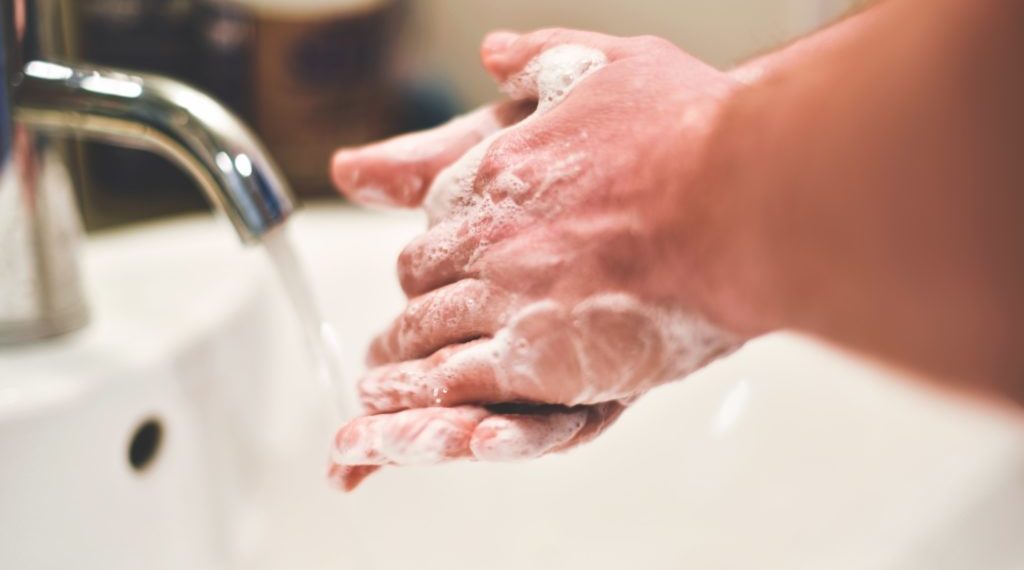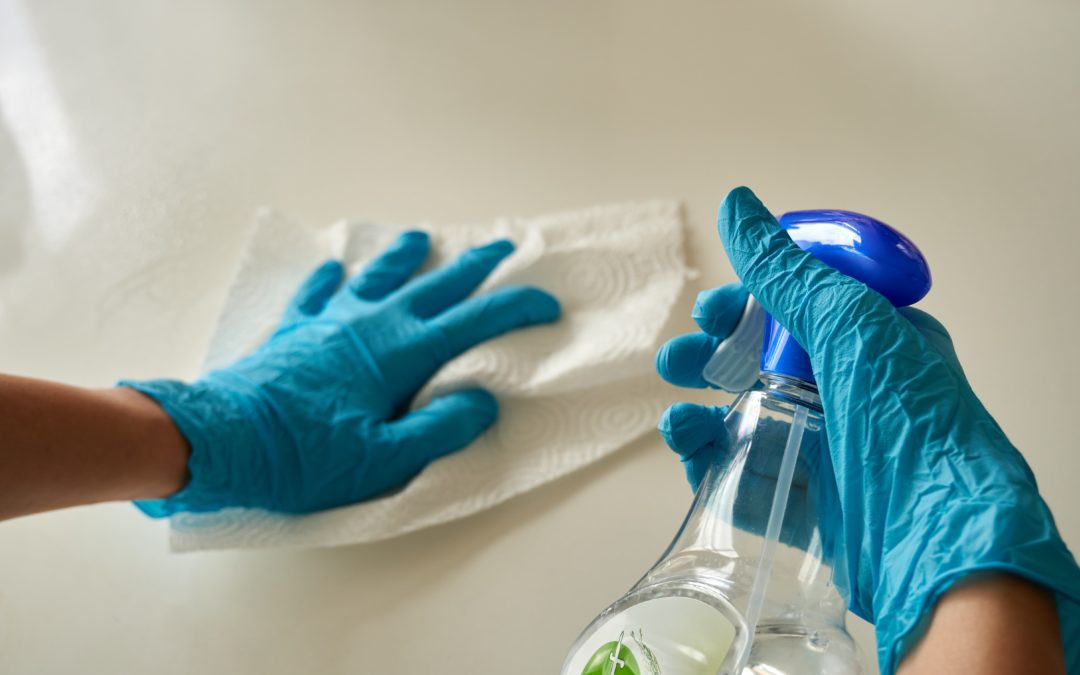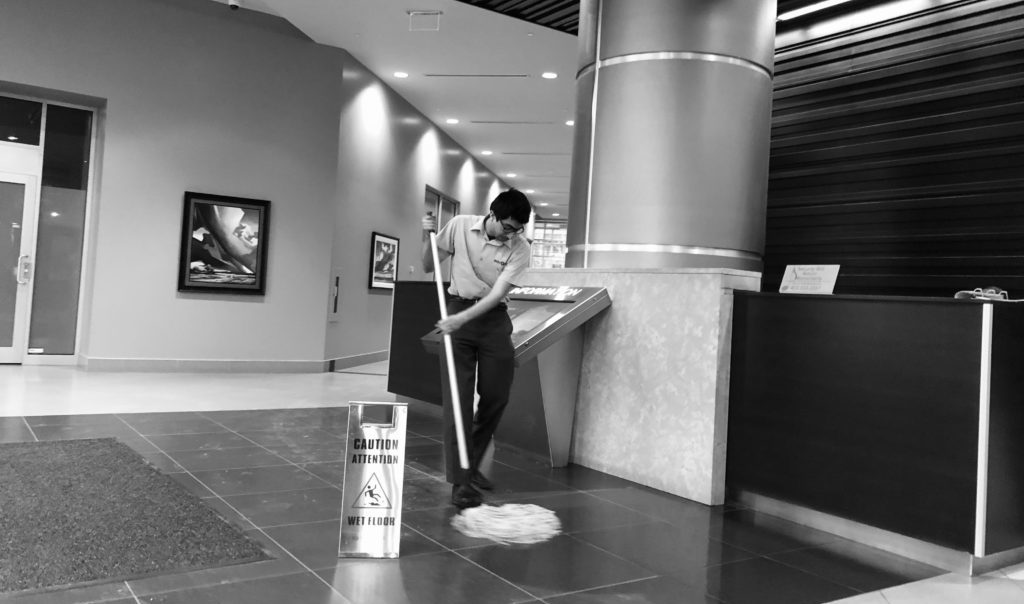Find out how you can use science and technology to create coronavirus cleaning protocols that keep your team and your clients safe.
It’s hard to say what the world will look like by the time you read this. With skyrocketing cases of the COVID-19 coronavirus, cleaning services are more in demand than ever, and the landscape seems to change every day. We are all, I hope, checking the Centers for Disease Control and Prevention (CDC) and World Health Organization (WHO) websites regularly for the latest science and information on cleaning protocols.
For those of us in the janitorial industry, there is some good news regarding coronavirus cleaning, however. Many of the recommendations around cleaning haven’t changed very much. The most significant differences are in frequency (more regular cleaning is better) and attention to detail (increased focus on high-touch areas). That’s not to say the job of a commercial cleaner hasn’t changed. We’ll take an in-depth look at some of those changes below. What it does mean is that your cleaning protocols, once you’ve established them, should remain relatively stable, with just a few minor updates here and there. We’ll get to those later, as well.
Here’s the bad news (or maybe it’s good news, depending on your outlook).
We know more about the spread of COVID-19 right now than we did even a month ago. That means even as the virus spreads, we have more information to work with regarding keeping ourselves and our clients safe and healthy. We can more confidently add to our cleaning checklists, reassure our clients, and forecast our schedule and inventory needs.
So what are some of the specific challenges facing commercial cleaning companies? Clients may be requesting additional one-time or ongoing services. Facilities are taking longer to clean, due to some of the newer guidelines. You might be hiring new employees with limited time to train them, while some of your current employees may need time off either for quarantine reasons or due to issues with childcare, throwing a pretty big wrench into the works. Let’s break this all down and make it work.
Make sure your cleaning team has the information they need to complete their job accurately and thoroughly. Implementing a janitorial software like Janitorial Manager can effectively transform your cleaning operation!
Managing your business with a new focus on COVID-19 coronavirus cleaning requirements
How COVID-19 spreads
You probably already know that the coronavirus, COVID-19, spreads through sneezes and coughs. Those airborne particles can then land and rest on surfaces for up to several days. When we touch those surfaces, the virus is on our hands, and we can easily contract and spread the disease. The virus can also spread through indirect transmission, including through “viral aerosolization in a confined space,” according to an article published by the University of Minnesota’s Center for Disease Research and Policy.
They go on to state that the virus may be able to spread easily from touching restroom faucet handles, elevator buttons, or even just through the air in small spaces. Additionally, Dutch scientists “were able to find the coronavirus in a city’s wastewater before COVID-19 cases were reported.”
In other words, restroom surfaces could be contaminated even if no one using the restroom shows symptoms of the virus. To make things even more complicated, people who tested positive for COVID-19 and have recovered may still be “shedding the virus in their sputum (phlegm) and poop,” according to an article in Business Insider.
That’s a lot of information, but the short version, as it pertains to commercial cleaning, is this: The COVID-19 coronavirus has the potential to contaminate through direct and indirect contact, and it can be especially concentrated in small areas like restrooms. What that means for you is that your coronavirus cleaning protocols must include a significant focus on restrooms, elevators, small lobbies, break rooms, or anywhere else with limited square footage and high-touch surfaces.
Your SOP for COVID-19 coronavirus cleaning
Alright. We know COVID-19 spreads easily. We know that since this is a new virus, we don’t have any immunity to it. However, it does impact people in a variety of ways. That gives us the possibility that even someone without symptoms could be spreading the virus. How does that affect your operating procedures regarding coronavirus cleaning?
For the sake of safety, it’s probably best to assume any facility you clean is contaminated. Your approach may vary depending on the space and any known contamination, of course. Cleaning a hospital or medical office will require a higher level of attention than, for example, a business office that’s been empty for a couple of weeks. You can read more about personal protective equipment and coronavirus cleaning standards here, or find out more about bidding on coronavirus cleaning jobs here.
The basic details are this:
In cases of potential coronavirus contamination, the minimum PPE guidance is for:
- An “N-95 respirator or a higher level of respiratory protection such as a powered air-purifying respirator”
- Eye protection
- Disposable gown and shoe covers
- Gloves
The CDC also recommends “routine environmental cleaning” for most facilities, and for cleaning products, look for those approved by the EPA for emerging viral pathogens. Other guidelines include providing employees with paid sick time to help limit the spread of the virus.

Putting it all together
So here we are with more cleaning contracts, possibly a smaller team if people are out sick, potentially new employees without training, and more detailed work in a range of facilities. Oh! There are also the issues of keeping track of inventory, equipment maintenance, changes to billing for current clients, one-time deep clean clients… it’s enough to make your brain feel like an attic full of cobwebs!
This is where your level of organization and the technology you use can help your commercial cleaning business stand out. For obvious reasons, we’re pretty biased in saying that we believe Janitorial Manager is the best in the industry for helping you stay on top of everything. That said, even if you don’t use our software, there are some ways you can manage your business while reducing the risk to your employees and providing the best possible customer service to your clients.
Organization will be critical.
If you have new employees, make sure you send them out to jobs with some of your most experienced and trusted employees. This is no time to let your customer service slide. Plan routes from one facility to the next as efficiently as possible. The less time your teams are traveling, the more time they spend working.
Track your supplies closely.
With more detailed work and (hopefully) more clients, you’re going to need to track your usage closely, so you always have the supplies you need to do the job. Be sure to factor in extra time for ordering supplies as well. Shipping companies are working overtime, and manufacturers are running on lower production schedules, so it could take a lot longer than usual for your orders to arrive.
Don’t overlook employee health.
If you don’t already offer paid sick time for employees, now is the time to consider it. If people come to work sick, there is a risk that your entire team could be out of commission. That would be bad for business. Remember, too, that taking care of your employees is a very simple way to retain staff, which is good for you both financially (it costs money to hire and train new people), and from a customer service standpoint (your customers want to know that you treat your employees well).
Plan to use PPE sparingly.
If you have limited supplies of PPE, try to plan in a way that maximizes its usage. For instance, if you contract with a medical office, reduce the number of people you send to clean it. That will require more hours in one location, but it should help you save on PPE, and your overall allotted hours for that location shouldn’t change too much. Meanwhile, that office building that’s been sitting empty for weeks? You won’t need as much PPE, as the risk of contamination is significantly lower.
And… Janitorial Manager can help you with all of this, and then some. For instance, our facial recognition software helps limit touching surfaces. The inspections app can help you guarantee that each job gets done the right way, even if you can’t be on location to inspect the work.
Our built-in bidding calculator will help you make quick, accurate proposals for clients. The inventory management and scheduling functions help you run an efficient, streamlined business. You’ll know exactly how to distribute your supplies and workload, so it makes the most sense.
Janitorial Manager can even help you with offering paid sick time. Because of the comprehensive project management and reporting functions, you can estimate and budget more accurately than ever before, and you can see exactly where you are spending your money. You might be shocked at how much more money you have when you improve your overall efficiency and planning.
Coronavirus cleaning will take some effort on your part. But it’s a chance to step up your game and take care of your business, your employees, and your customers.
Make more accurate bids, more quickly, with Janitorial Manager’s built-in bidding calculator. Contact us right now for a free, no-obligation demo and find out exactly how you can start winning more business.


